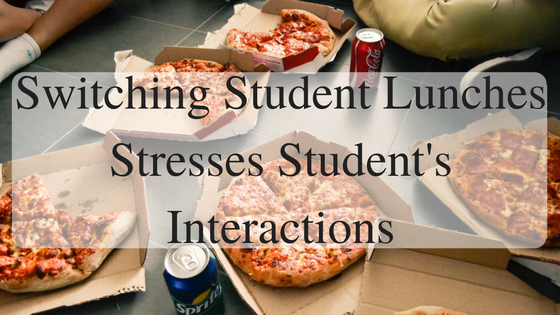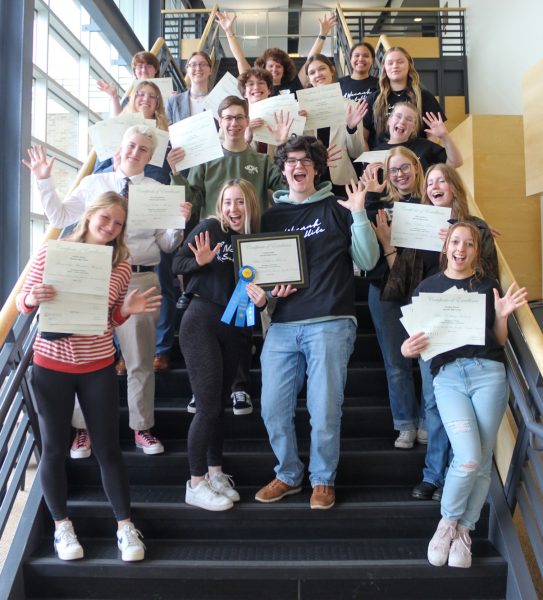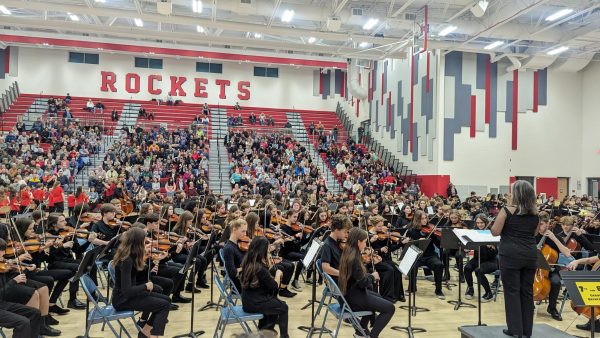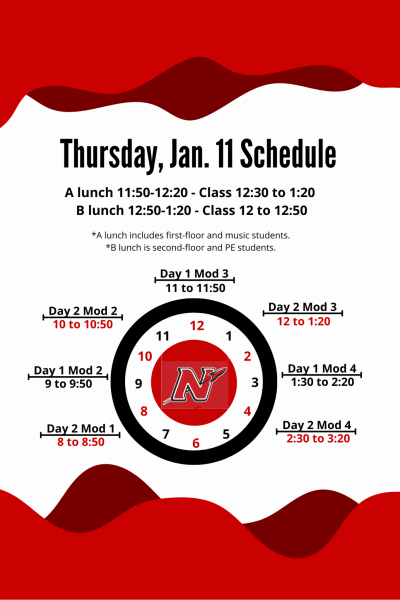Switching Freshman Lunches Stresses Students’ Interactions

Photo by: stocksnap.io
Administration keeps changing Freshman Seminar’s lunch times throughout the weeks creating confusion and stress for students and staff.
Recently, a change was implemented on the NHS lunch schedule.
Because of misbehavior during freshmen lunch, three seminars are pulled out every week and tossed among the upperclassmen in either Lunch A or C. The change is not a permanent thing – the seminars go to the new lunch for a week, are back in Lunch B for two weeks, and once again return to the different lunch for a final week. Once that is over with, the students are brought back to Lunch B, at least until the second semester.
It seems simple; however, there are plenty of freshmen who are unhappy with the change.
Administration, on the other hand, fully supports the idea. In more than one way, the students and staff have clearly opposing opinions on the matter.
The misbehavior of students is a matter that is undeniable, even to the students. The difference in volume of Lunch B when compared with the other two lunches is easy for anyone to notice, as well as the mess that the students leave for Lunch C to clean up. Some students, however, do not seem to realize the magnitude of the problem. Freshman Nikki Messick said that, while she did believe that the students in Lunch B were being loud, she did not think it was too severe of an issue. Ollie Monson, freshman, offers insight onto why this might be. “ It’s not really much louder than it was at Shattuck, which was pretty loud I guess,” she admitted, “but it seems pretty normal to us. I guess that’s kind of just how our lunch experiences were.”
Overall, the administration of the school thought that the problem was significant enough that something needed to be done. “You can’t just keep doing the same thing because you’re going to get the same results, so to just leave them all in B Lunch for the rest of the semester, nothing would really change,” said Chris Rundquist, a social studies teacher. While he was not involved in the choosing of the solution, he has a Launch class of his own during fifth mod. “And there’s just so many times that you can tell kids to pick up after themselves, quiet down, settle down, sit, stuff like that.” Rundquist fully supports the change. He believes the switch is necessary.
How is a lunch switch supposed to help? According to Mr. Rundquist, the change was made in order to show the freshmen how they are supposed to behave in a lunchroom. “When you’re with all of your own age group, you may not have that ability to see the role models, or hear people saying, ‘Hey we don’t accept this, and we don’t think this is a good idea.’” According to Rundquist, the upperclassmen are supposed to act as examples of correct lunchroom behavior, as well as the ones to tell a freshman when they need to stop.
The students understand the goal of the lunch switches, but that does not mean that they agree. Most students believe that there will not be any change because of this. “I think it’s probably just going to stay the same,” Nikki Messick said. “We’re freshmen.” Both Messick and Monson believed as well that, with only three seminars switching each week, there will be a very minimal change. “If they really wanted to help the freshmen I don’t think they would have done it in such small groups,” Monson pointed out. She also discussed the lunch atmosphere with the upperclassmen, “[During the] two weeks that we’re going to be with the upperclassmen, we’re going to be quiet and good, because we’re going to be a little intimidated by them, but then the instant we’re all back in Lunch B we’re just going to be loud and noisy again.”
There are other concerns that the students have: the separation of friends. If a freshman has no friends in their seminar and nobody to sit by at lunch, the situation can create stress. “I’m worried that I’m probably just gonna have to sit by myself and eat by myself, and not have anybody to sit with and probably be pretty lonely,” Messick admitted.
There are also other small matters, like where students are going to sit. By the first week of school, friend groups have claimed their spots. With the lunches switching, freshmen are now wondering where they are supposed to go, and worrying about whether or not they are taking upperclassmen students’ seats. These are only minor things, however, and according to Rundquist it is not something about which to be overly concerned.
He explained that it is a pretty harmless approach and a pretty easy approach to give the kids the opportunity to change their behavior, without really any major impacts on their day. Ultimately, students are eating a different lunch two weeks out of their first semester.
He acknowledged that it does mean that they might be away from some of their friends for two weeks. Does it mean they might have to sit at a different table for two weeks? He said that in the grand scheme of things: “that’s not a horrible thing to have happen to them.”
All in all, students and teachers are likely to have differing views on this issue. Joshua Arboleda, freshman, for example, has very strong opinions against the change. “Lunch is supposed to be a time we relax,” he says. “That’s where you get to eat, talk with your friends. . . but because they’re separating all of the freshmen, now you won’t be able to see all of your friends, and instead you’ll only be able to see only a few of them.” He knows that will happen second semester, but first semester is supposed to bring freshmen to high school. “We’re being driven down into the depths of high school,” Arboleda said.
Some students view the change as harsh — worrying about being away from their friends, and pondering on how this change is supposed to solve anything. In contrast, Rundquist believes this was a solution that solves a problem. Only a few dozen students are really affected, and in the grand scheme of things is the easiest route possible.
“This is an approach that is really easy to implement, really easy to understand, really least impactful on the vast majority of the 2,000 students at this school. . .” he pointed out.
He added that most of the freshmen are doing what is expected. “It’s that group of students that routinely aren’t picking up after themselves, running around the lunchroom, being loud, being boisterous, not following directions — that’s the group that’s really driving this.”










